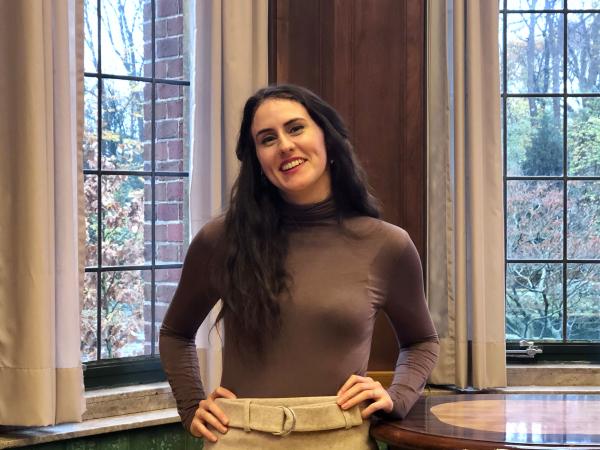My name is Daphne Engel, I am currently in the process of graduating with a master’s degree in International Relations – specialization track Global Political Economy at Leiden University. During the Covid-19 pandemic, I was lucky to find out about available study spots in the Peace Palace Library which soon became my anchor point. Entering the gates of the Peace Palace makes me feel like a princess. I am sure I will cherish my working hours in this magnificent place for many years to come.
Having a collection of leading journal publications laid out at the library entrance has been helpful for my recently written essays. As I conduct my research on topics such as migranthood, refugee governance and economic development, I’ve used journals such as the Review of International Studies, International Journal of Refugee Law, International Affairs, and Journal of Refugee Studies. I’ve also used constitutional law books of several countries in Africa and Brazil. For the latter, I dove into the significant developments taking place in the Amazon rainforest in Brazil during the Covid-19 pandemic. As you can read from here, I am quite enthusiastic about research concerning the upliftment of suppressed populations.
From the Peace Palace Library, I basically carry out all my work; I’ve just finished writing a PhD research proposal and I am now finishing my master’s thesis whilst writing a research paper on the subject of a Jordanian refugee campsite Za’atari. On the side, I’m co-organizing a conference, next to reading Property, Institutions, and Social Stratification in Africa (Obeng-Odoom, 2020) that I am reviewing for Progress in Development Studies (a must-read!). Online classes, zoom-meetings, and mini-united nations gatherings, I also take part in from the Library Reading Room.
I find the location to be stimulating; the atmosphere is majestical, it is peaceful and I get the sense that I am surrounded by a hard-working ethic flowing in from the courts. The facilities offered in the library are sublime as I can read and borrow works ranging from World Bank policies to land ownership rights. I am able to drink my daily dose of tremendous coffee’s, have conversations with lovely staff-members, and catch some fresh air in the forests right outside. Another bonus for me is the old-fashioned librarian vibe I get from the library’s decor. So, I am quite grateful for Carnegie’s legacy – making from the Peace Palace Library a public good – of which I can take full advantage of by working from the Library Reading Room.
Most importantly, the library has inspired me to possibly start another master program, an LL.M in International Law and Human Rights, in February of next year. Talking to some staff members, as well as trainees from the International Criminal Court (ICC), enabled me to look into the option of pursuing a degree in international law. In terms of my research scope, I realized that land politics, and the international governing aspect of refugee campsites is an understudied subject, and significant for my research field. Attributing to this decision is the philosophy I hold dear that originates from ancient Confucianism (Lao Tzu), which entails that 'if one wants to grow into a ‘knowledgeable master’; one should study until the age of 30'.
I feel the urge to cover most aspects with regards to the development of the Global South, and as of now, I’ve covered this in study programmes in History (University of Groningen), Development Studies (Erasmus University), and Global Political Economy (Leiden University). Studying International Law for me would be the cherry on the pie that finalizes my background knowledge on the subject which hopefully results in me becoming somewhat of a specialist on the topic of refugee campsites and their relation to development aid. After (or even during) this master’s degree, I’m planning on starting my PhD on this topic.
Since I am eager for new knowledge and challenges, and constantly dreaming whilst evolving ideas, I choose to follow my intuition and continue studying. By doing so I built a theoretical foundation, and facilitate towards creative collusion, which enables me to then turn my ideas into reality. The world is in need of structural changes. To reach those, I ought it amiable for us as individuals to develop our own path: by following our heart and passions the rest will tend to itself. In that way, humanity can truly attribute to the cooperation that we essentially are.
